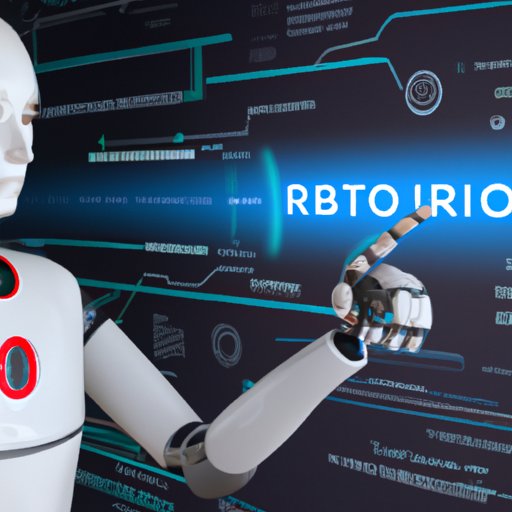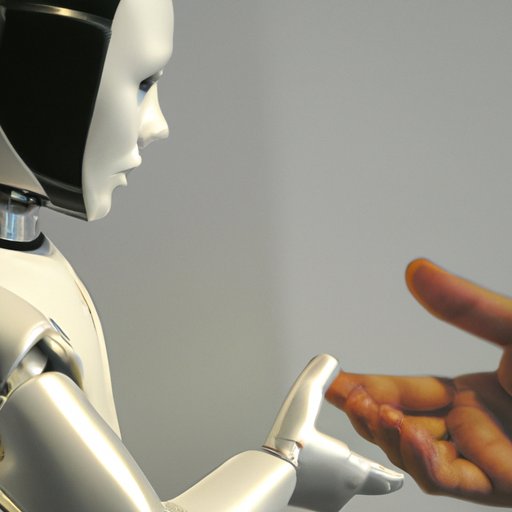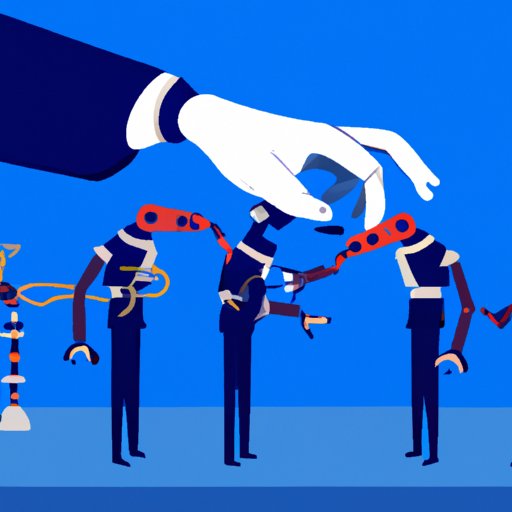Introduction
The term “robot” refers to any machine or device that can perform tasks autonomously or with minimal human input. Robots are often associated with automation – the use of technology to streamline processes and reduce labor costs – and this is an area where robotics is rapidly advancing. As robotics technology continues to improve, its applications are becoming increasingly widespread, from industrial automation to healthcare and beyond. This raises questions about the potential for robots to shape our future, and what implications this may have for humans.

Exploring the Pros and Cons of Robots in Our Future
One of the primary benefits of using robots and automation is increased efficiency and decreased costs. Automation can reduce the need for manual labor and eliminate costly errors, leading to time and cost savings. For example, a study by McKinsey Global Institute found that automation could save businesses up to $3 trillion in labor costs by 2030. While automation has the potential to benefit businesses, it also carries potential risks for human workers. Automation could lead to job losses in certain industries, as machines become increasingly capable of performing tasks that were once done manually.

Examining the Impact of Automation on Human Labor
In addition to the potential for job losses, automation could also result in a shift from manual labor to more complex tasks. According to a report by the World Economic Forum, “As robots and other forms of automation take over many of the lower-skilled jobs, the nature of work will change and more people will be required to do higher-skilled tasks.” This could potentially create new opportunities for those who are willing and able to acquire the necessary skills. However, it could also result in unequal access to these opportunities, depending on socio-economic factors such as income and education level.
How Robotics Will Revolutionize Manufacturing
Robotics will also revolutionize the manufacturing industry. According to a survey conducted by Deloitte, nearly two-thirds of manufacturers believe that robotics and automation will be essential for their business in the next five years. Robotics can increase efficiency and accuracy in production, which can lead to significant cost savings. Additionally, robots can be used to automate dangerous and tedious tasks, creating a safer working environment for human employees. This could also lead to increased productivity, as robots can operate 24 hours a day without breaks.
What Social Implications Will Robots Have?
Robots could also have a profound impact on society. They could potentially change the way we interact with each other and the world around us. For example, robots could alter the dynamics of social interactions, as people become more comfortable interacting with machines than with other humans. Additionally, robots could have a major impact on education, as they become increasingly capable of providing personalized instruction and feedback.
The Potential Benefits and Risks of Artificial Intelligence
The development of artificial intelligence (AI) is another area where robotics is rapidly evolving. AI-powered robots could provide numerous benefits, from improved decision-making to enhanced customer service. However, there are also potential risks posed by AI, such as the possibility of data breaches or misuse of information. Additionally, AI could lead to job losses, as machines become increasingly capable of performing certain tasks that were once done by humans.

Exploring the Ethical Considerations of Robots in Everyday Life
When considering the potential for robots to play a role in our future, it is important to consider the ethical implications. Questions arise regarding privacy and security, as well as moral and ethical considerations. For example, if robots become more integrated into our lives, how will this affect our rights and freedoms? How will we ensure that robots are programmed to act responsibly and ethically? These are questions that must be addressed in order to ensure that robots are not misused or abused.
Conclusion
Robots and automation have the potential to revolutionize the way we live and work. From increased efficiency and decreased costs to potential job losses and implications for human labor, the implications of robotics in our future are far-reaching. Additionally, robots could have a major impact on manufacturing, social dynamics and education, as well as raise ethical considerations regarding privacy and security. Although there are potential risks associated with robotics, the potential benefits could outweigh them if the technology is developed and implemented responsibly.
In conclusion, robots could play a major role in our future, but it is important to consider the potential implications for human labor, manufacturing, social dynamics and ethical considerations. Further exploration is needed in order to ensure that robots are used responsibly and ethically, and that their potential benefits outweigh any potential risks.
(Note: Is this article not meeting your expectations? Do you have knowledge or insights to share? Unlock new opportunities and expand your reach by joining our authors team. Click Registration to join us and share your expertise with our readers.)
